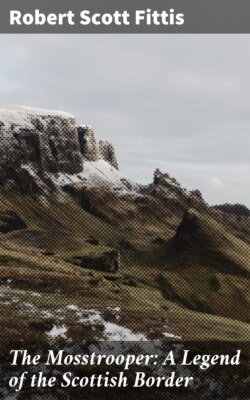Читать книгу The Mosstrooper: A Legend of the Scottish Border - Robert Scott Fittis - Страница 5
На сайте Литреса книга снята с продажи.
Chapter II.
ОглавлениеTable of Contents
He’s married a may, and he’s fessen her hame;
But she was a grim and a laidly dame.
When into the castle court drave she,
The seven bairns stood wi’ the tear in their e’e.
Nor ale nor mead to the bairnies she gave,
“But hunger and hate frae me ye’s have.”
—Danish Ballad.
TWENTY years elapsed after the midnight when the infant boy was left at Hawksglen Castle by the gentle Johnston, whom we dub with that epithet in accordance with the Border usage of characterizing the principal families, or clans, as the haughty Homes, the bauld Rutherfords, the sturdy Armstrongs, the gentle Johnstons, et sic de cæteris. But “gentle,” as applied to the Johnstons, was an ironical misnomer, they being a peculiarly rude and turbulent race, living in “sturt and strife.” A story is told that a Baron, who was at deadly feud with them, having captured several, ordered their heads to be cut off and flung into a sack, which he gave to one of his retainers to carry home; and the man, when he got the grisly burden upon his back, gave it a good shake, saying jocosely, “Gree amang yoursells, Johnstons!” Our Johnston seemed a full-fledged scion of this law-defying race.
Let us now fill up the gap of those twenty years with a brief recital of events which concern our tale.
Sir James Elliot of Hawksglen was the lineal descendant of a famous Border house; and a worthier representative of a baronial stock it would have been rather difficult to single out among his compeers. High renown had been earned by his ancestors in the feuds and wars of the marches. His father received his death-wound in resisting a Southron inroad some few years anterior to the period when our legend opens. Sir James, an only son and only child, was thus left master of wide domains when he had just passed his majority. His mother was an amiable lady; but after the loss of her husband she never regained that happy buoyancy of mind which had distinguished her during her wedded life. To all her dependants she was a kind and indulgent mistress, ever ready to forgive shortcomings, and to relieve the wants of humble vassals when overtaken by pinching poverty. Seeing that her son inherited the martial spirit of his sire, it became her aim to induce him to bury animosities and feuds, and to cultivate, as much as he could, and as far as the circumstances of the times allowed, the arts of peace. She meant well. But Sir James would say to himself, as he paced through his hall, and gazed on several grim portraits of the Elliots of Hawksglen with which it was decorated:—
“My mother’s mild precepts would avail in some other age and land; but they are vain in this Border country, where every man rights himself by his own hand, and wins honour and esteem by martial valour. When every man draws his blade in his own quarrel, dare I keep mine unsheathed without incurring disdain and disgrace? Nay—in these times I must uphold the dignity of our house with the steel in my grasp and the corselet on my breast.”
Sir James was ardent and fiery by nature, yet evincing generous and chivalrous impulses. In stature he rather exceeded the middle height, and had a manly and well-formed figure. His face was oval and swarthy-complexioned, its expression being mild and thoughtful in repose, but under excitement becoming instinct with strong animation. As yet in early manhood, he was unmarried, and so far as appeared had never been wounded by a shaft from Cupid’s bow.
The midnight adventure at the gate exceedingly amazed the knight and his mother, and probably induced a certain suspicion in the latter’s mind; but they resolved to shelter and provide for the child until its parents should be discovered. Every means were used to penetrate the mystery; but, owing to troubles which broke out along the Border, all inquiries proved fruitless, and even rumour was dumb. The child’s habiliments and the ornament about its neck betokened that its lineage was above the common. Thus weeks and months sped away, and the foundling was treated with as much care and kindness as could have been bestowed upon a son of the family; which, indeed, the retainers could not help suspecting that he was, and therefore, they gradually refrained from rehearsing to others the story of his exposure at the gate.
The boy was healthy, with pleasing features, a soft skin, and a clear complexion. He soon became familiar with his new guardians; and the lady forgot her sorrows in ministering to his wants, and fondling him upon her knee. A priest from a neighbouring chapel admitted the foundling within the pale of the visible Church by the Sacrament of Baptism, and christened him by the name of Eustace, in memory of the lady’s only brother who had died in infancy.
When Eustace had seen about a couple of years under the hospitable roof of Hawksglen, the lady was seized with a malignant distemper, which was destined to close her days. Despite the skill of physicians, the rapid progress of the disease could not be arrested: the lamp of hope burned dim: and now—
